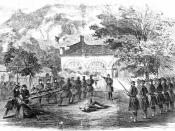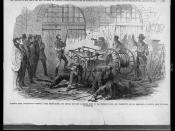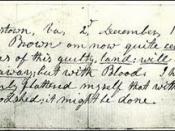The views of John Brown's raid of the federal armory at Harpers Ferry illustrate the changing of North-South relations between the years of 1859 and 1863. After the event occurred, many looked down upon it in order to try and prevent the inevitable Civil War. However, throughout the next few years many people began to praise him for his radical abolitionism, even to the point of martyrdom.
Horace Greeley, a well known anti-slavery activist and editor of the New York Tribune at the time, disagreed with Brown's method, although he did agree with Brown's motives. In a December 3rd, 1859 editorial he wrote, "There are fit and unfit modes of combating a great evil; we think Brown at Harpers Ferry pursued the latter...And, while we heartily wish every slave in the world would run away from his master tomorrow and never be retaken, we should not enter a slave state to incite them to do so..."
It is this excerpt that shows his negative opinion of John Brown's modus operandi and his wish that slavery would be abolished through other means. This was a common viewpoint in the North, which leaned toward abolition. This viewpoint on Brown's actions signified the rising tensions between the North and South.
However, another editorial written weeks before in the Topeka Tribune condemned the act and Brown's resulting martyrdom, which contradicted Greeley's view of the martyrdom. They openly accuse two types of people, Republicans and "Men belonging to the Wendell Phillips school." The editor states that the latter group calls him a patriot and Christian giving him the praise of a hero. The Republicans, being a northern based political party and mostly anti-slavery, are said to apologize for the act but underneath their veil they praise him as much as they can in their...



Good Essay.
I really like how you focused on the raid on Harper's Ferry- all of the documents you stated supported the idea and were well expressed.
4 out of 4 people found this comment useful.